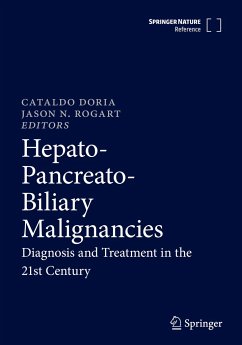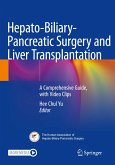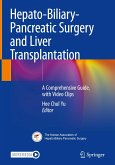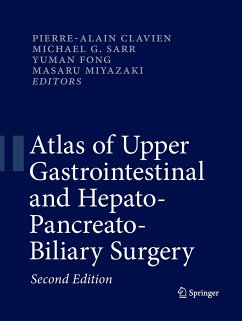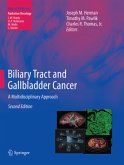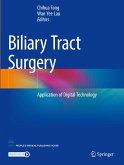Hepato-Pancreato-Biliary Malignancies
Diagnosis and Treatment in the 21st Century
Herausgegeben:Doria, Cataldo; Rogart, Jason N.
Hepato-Pancreato-Biliary Malignancies
Diagnosis and Treatment in the 21st Century
Herausgegeben:Doria, Cataldo; Rogart, Jason N.
- Gebundenes Buch
- Merkliste
- Auf die Merkliste
- Bewerten Bewerten
- Teilen
- Produkt teilen
- Produkterinnerung
- Produkterinnerung
Hepato-Pancreato-Biliary cancers are increasing in incidence, with pancreatic cancer now accounting for the third most cancer deaths in the United States. Typically these malignancies, as a group, are managed by the same key providers comprising a multidisciplinary team.
This book is intended to provide a comprehensive review of the current knowledge in the field of hepato-pancreato-biliary malignancies, focusing on the practical and clinical care of patients. We take the approach of combining the collective expertise of an interventional gastroenterologist and a hepato-pancreato-biliary…mehr
Andere Kunden interessierten sich auch für
![Hepato-Biliary-Pancreatic Surgery and Liver Transplantation Hepato-Biliary-Pancreatic Surgery and Liver Transplantation]() Hepato-Biliary-Pancreatic Surgery and Liver Transplantation87,99 €
Hepato-Biliary-Pancreatic Surgery and Liver Transplantation87,99 €![Hepato-Biliary-Pancreatic Surgery and Liver Transplantation Hepato-Biliary-Pancreatic Surgery and Liver Transplantation]() Hepato-Biliary-Pancreatic Surgery and Liver Transplantation118,99 €
Hepato-Biliary-Pancreatic Surgery and Liver Transplantation118,99 €![Case-Based Lessons in the Management of Complex Hepato-Pancreato-Biliary Surgery Case-Based Lessons in the Management of Complex Hepato-Pancreato-Biliary Surgery]() Case-Based Lessons in the Management of Complex Hepato-Pancreato-Biliary Surgery100,99 €
Case-Based Lessons in the Management of Complex Hepato-Pancreato-Biliary Surgery100,99 €![Atlas of Upper Gastrointestinal and Hepato-Pancreato-Biliary Surgery Atlas of Upper Gastrointestinal and Hepato-Pancreato-Biliary Surgery]() Atlas of Upper Gastrointestinal and Hepato-Pancreato-Biliary Surgery193,99 €
Atlas of Upper Gastrointestinal and Hepato-Pancreato-Biliary Surgery193,99 €![Biliary Tract and Gallbladder Cancer Biliary Tract and Gallbladder Cancer]() Biliary Tract and Gallbladder Cancer85,99 €
Biliary Tract and Gallbladder Cancer85,99 €![Biliary Tract Surgery Biliary Tract Surgery]() Biliary Tract Surgery85,99 €
Biliary Tract Surgery85,99 €![Biliary Tract Surgery Biliary Tract Surgery]() Biliary Tract Surgery116,99 €
Biliary Tract Surgery116,99 €-
-
-
Hepato-Pancreato-Biliary cancers are increasing in incidence, with pancreatic cancer now accounting for the third most cancer deaths in the United States. Typically these malignancies, as a group, are managed by the same key providers comprising a multidisciplinary team.
This book is intended to provide a comprehensive review of the current knowledge in the field of hepato-pancreato-biliary malignancies, focusing on the practical and clinical care of patients. We take the approach of combining the collective expertise of an interventional gastroenterologist and a hepato-pancreato-biliary surgeon to provide the readers with accurate, succinct, and pragmatic information needed to formulate the most appropriate treatment plan for their patients with the aim of the best possible outcome.
Managing patients with these cancers continues to be challenging because of continued dismal survival rates. Each section in this text is written by experts intheir respective field, summarizing the most state-of-the-art, contemporary diagnostic and therapeutic tools available in the field. We believe this book will prove to be an invaluable, comprehensive resource for all members of the multidisciplinary team caring for patients with hepato-pancreato-biliary malignancies.
Hinweis: Dieser Artikel kann nur an eine deutsche Lieferadresse ausgeliefert werden.
This book is intended to provide a comprehensive review of the current knowledge in the field of hepato-pancreato-biliary malignancies, focusing on the practical and clinical care of patients. We take the approach of combining the collective expertise of an interventional gastroenterologist and a hepato-pancreato-biliary surgeon to provide the readers with accurate, succinct, and pragmatic information needed to formulate the most appropriate treatment plan for their patients with the aim of the best possible outcome.
Managing patients with these cancers continues to be challenging because of continued dismal survival rates. Each section in this text is written by experts intheir respective field, summarizing the most state-of-the-art, contemporary diagnostic and therapeutic tools available in the field. We believe this book will prove to be an invaluable, comprehensive resource for all members of the multidisciplinary team caring for patients with hepato-pancreato-biliary malignancies.
Hinweis: Dieser Artikel kann nur an eine deutsche Lieferadresse ausgeliefert werden.
Produktdetails
- Produktdetails
- Hepato-Pancreato-Biliary Malignancies
- Verlag: Springer / Springer International Publishing / Springer, Berlin
- Artikelnr. des Verlages: 978-3-030-41682-9
- 1st ed. 2022
- Seitenzahl: 892
- Erscheinungstermin: 1. Oktober 2022
- Englisch
- Abmessung: 260mm x 183mm x 50mm
- ISBN-13: 9783030416829
- ISBN-10: 3030416828
- Artikelnr.: 58540769
- Herstellerkennzeichnung Die Herstellerinformationen sind derzeit nicht verfügbar.
- Hepato-Pancreato-Biliary Malignancies
- Verlag: Springer / Springer International Publishing / Springer, Berlin
- Artikelnr. des Verlages: 978-3-030-41682-9
- 1st ed. 2022
- Seitenzahl: 892
- Erscheinungstermin: 1. Oktober 2022
- Englisch
- Abmessung: 260mm x 183mm x 50mm
- ISBN-13: 9783030416829
- ISBN-10: 3030416828
- Artikelnr.: 58540769
- Herstellerkennzeichnung Die Herstellerinformationen sind derzeit nicht verfügbar.
Dr. Cataldo Doria is an internationally renowned surgeon who specializes in surgical treatments of the liver, pancreas, and bile duct. Dr. Doria spent a quarter of a century in academic medicine, at University of Pittsburg Medical Center in Pittsburgh first, and at Thomas Jefferson University Hospital in Philadelphia later. Dr. Doria was a major contributor to the start-up of the European Medical Division of the University of Pittsburgh Medical Center, which resulted in a cultural and scientific cooperative agreement between the University of Pittsburgh and the University of Palermo - Italy. This partnership led to the development of the Istituto Mediterraneo per i Trapianti e Terapie ad Alta Specializzazione,(IsMeTT), a health care delivery system that serves the entire Mediterranean Basin and specializes in solid organ transplantation and cancer care. From 1999 to 2003, Dr Doria, was the clinical leader of IsMeTT. At Thomas Jefferson University Hospital in Philadelphia, PA, he served as the surgical director of the Sidney Kimmel Cancer Center - Jefferson Liver Tumor Center at Jefferson Medical College, and director of the Jefferson Transplant Institute. During his 15 years tenure at Jefferson Dr. Doria resurrected, first hand, a program in agony and made it one of the best in the Country for volume, outcome, patient satisfaction, and innovative research. Dr. Doria received his medical degree at University of Perugia School of Medicine in Italy, where he also completed his internship and residency. He completed a research fellowship and a clinical fellowship in multi-organ transplant surgery at the Pittsburgh Transplantation Institute, part of the University of Pittsburgh School of Medicine in Pittsburgh, PA. Dr. Doria is a PhD in biotechnology and transplant immunology; he is, also, one of the few Doctors worldwide that successfully completed a clinical fellowship in living donor liver transplantation atthe Organ Transplantation Center, part of Asan Medical Center in Seoul, South Korea. Dr. Doria is a 2016 Temple Fox School of Business graduate. Dr. Doria is currently the Medical Director of the Cancer Center at Capital Health in Pennington, NJ. During the first three years of his tenure at Capital Health, under Dr. Doria's leadership, the net revenue of the cancer center increased in excess of 25% every year. Dr. Doria has pioneered new techniques for conditions that were once considered untreatable. He has helped developing and introducing a number of innovative procedures to treat cancer patients that were not previously available, including bloodless liver surgery, ex-vivo liver resection with liver auto-transplantation and robotic-assisted hepato-pancreato-biliary surgery. He completed the first robotic assisted Whipple procedure in the State of New Jersey. Dr. Jason N. Rogart As an interventional gastroenterologist and therapeutic endoscopist, Dr. Rogart performs the latest and most advanced procedures for the testing and non-surgical treatment of pancreato-biliary disorders and malignancies. He is nationally recognized as an expert in the fields of endoscopic ultrasound (EUS), endoscopic retrograde cholangiopancreatography (ERCP), pseudocyst drainage, enteral stent placement, advanced endoscopic imaging, as well as numerous other procedures which help in the care of patients with gastrointestinal malignancies. Dr. Rogart received his medical degree from Brown Medical School and completed his internship and residency at Yale University in the Department of Internal Medicine at Yale-New Haven Hospital, where he was also Chief Resident. He completed his fellowship training in digestive diseases at Yale University/Yale-New Haven Hospital and subsequently was an Advanced Endoscopy fellow in the Division of Gastroenterology & Hepatology at Thomas Jefferson University Hospital in Philadelphia, PA. Dr. Rogart holds an academic appointment at Rutgers-Robert Wood Johnson Medical School. Dr. Rogart has published numerous original research articles and chapters in various national and international journals and resource textbooks. He has also been an invited speaker and faculty member at numerous locoregional and national conferences, including Digestive Diseases Week, the American Society for Gastrointestinal Endoscopy, the American College of Gastroenterology and the Society of Gastrointestinal Nurses and Associates. He is a reviewer for several national and international clinical publications. In 2014, Dr. Rogart was awarded the honorable distinction of "Fellow" in the American Society of Gastrointestinal Endoscopy (FASGE) for his lifelong contributions to the field of GI endoscopy and his dedication to patient care, research, teaching, and service.
Approach to the patient with a solid liver mass.- Pathogenesis, Epidemiology and Prognosis of Hepatocellular carcinoma (HCC).- HCC Pathology.- Diagnosis and Evaluation of HCC.- Liver-directed therapy (IR) for HCC.- Medical Management of HCC.- Surgical Management of HCC.- Treatment of liver metastasis from colorectal cancer.- Treatment of isolated liver metastasis from non-colorectal cancer.- Pathogenesis, Epidemiology and Prognosis of Uncommon Liver Tumors.- Diagnosis and Management of Uncommon Liver Tumors.- Reducing the Risk of and Screening for Liver Cancer.- Pathogenesis, Epidemiology and Prognosis of Cholangiocarcinoma.- Pathology of Cholangiocarcinoma.- Diagnosis and Evaluation of Cholangiocarcinoma.- Nonsurgical Management of Cholangiocarcinoma.- Surgical Management of Cholangiocarcinoma.- How do I approach Klatskin's tumor.- Endoscopic Palliative Management of Cholangiocarcinoma.- Rare Tumors of the Bile Ducts: Pathogenesis, Epidemiology, Diagnosis, and Management.- Pathogenesis, Epidemiology and Prognosis of Gallbladder Cancer.- Diagnosis and Evaluation of Gallbladder Cancer.- Pathology of Gallbladder Cancer.- Nonsurgical Management of Gallbladder Cancer.- Surgical Management of Gallbladder Cancer.- Approach to the Patient with a Pancreatic Mass.- Evaluation and Management of the Patient with a Pancreatic Cyst.- Pathogenesis, Epidemiology and Prognosis of Pancreatic Adenocarcinoma.- Diagnosis and Evaluation of Pancreatic Adenocarcinoma.- Pathology of Pancreatic Adenocarcinoma.- Nonsurgical management of Pancreatic Adenocarcinoma,- Surgical management of Pancreatic Adenocarcinoma.- Intra-operative radiation treatment.- Endoscopic Palliative Management of Pancreatic Adenocarcinoma.- Reducing the Risk of and Screening for Pancreatic Cancer.- Pathogenesis, Epidemiology and Prognosis of Pancreatic Neuroendocrine Tumors.- Pathology of Pancreatic Neuroendocrine Tumors.- Diagnosis and Evaluation of Pancreatic Neuroendocrine Tumors.- Nonsurgical management ofPancreatic Neuroendocrine Tumors.- Surgical Management of Pancreatic Neuroendocrine Tumors.- Emerging endoscopic therapies for Pancreatic Neuroendocrine Tumors.- Pathogenesis and Pathology of Rare Pancreatic Neoplasms.- Diagnosis and Management of Rare Pancreatic Neoplasms.- Molecular and Genetic Profiling for Diagnosis and Therapy of Hepatobiliary and Pancreatic Malignancies.- The Role of Robotic Surgery in Treating Hepatobiliary and Pancreatic Malignancies.- The Importance of the Multidisciplinary Approach to Managing Hepatobiliary and Pancreatic Malignancies.- The Role of the Palliative Care Team in the Management of Hepatobiliary and Pancreatic Malignancies.- The Role of Alternative Medicine in the Management of Hepatobiliary and Pancreatic Malignancies.- Integrative Medicine and Hepatobiliary and Pancreatic Cancer: What to Expect.- Is Personalized Medicine Truly Making a Difference for Patients Diagnosed with Cancers of the Liver, Biliary Tract, and Pancreas.
Approach to the patient with a solid liver mass.- Pathogenesis, Epidemiology and Prognosis of Hepatocellular carcinoma (HCC).- HCC Pathology.- Diagnosis and Evaluation of HCC.- Liver-directed therapy (IR) for HCC.- Medical Management of HCC.- Surgical Management of HCC.- Treatment of liver metastasis from colorectal cancer.- Treatment of isolated liver metastasis from non-colorectal cancer.- Pathogenesis, Epidemiology and Prognosis of Uncommon Liver Tumors.- Diagnosis and Management of Uncommon Liver Tumors.- Reducing the Risk of and Screening for Liver Cancer.- Pathogenesis, Epidemiology and Prognosis of Cholangiocarcinoma.- Pathology of Cholangiocarcinoma.- Diagnosis and Evaluation of Cholangiocarcinoma.- Nonsurgical Management of Cholangiocarcinoma.- Surgical Management of Cholangiocarcinoma.- How do I approach Klatskin's tumor.- Endoscopic Palliative Management of Cholangiocarcinoma.- Rare Tumors of the Bile Ducts: Pathogenesis, Epidemiology, Diagnosis, and Management.- Pathogenesis, Epidemiology and Prognosis of Gallbladder Cancer.- Diagnosis and Evaluation of Gallbladder Cancer.- Pathology of Gallbladder Cancer.- Nonsurgical Management of Gallbladder Cancer.- Surgical Management of Gallbladder Cancer.- Approach to the Patient with a Pancreatic Mass.- Evaluation and Management of the Patient with a Pancreatic Cyst.- Pathogenesis, Epidemiology and Prognosis of Pancreatic Adenocarcinoma.- Diagnosis and Evaluation of Pancreatic Adenocarcinoma.- Pathology of Pancreatic Adenocarcinoma.- Nonsurgical management of Pancreatic Adenocarcinoma,- Surgical management of Pancreatic Adenocarcinoma.- Intra-operative radiation treatment.- Endoscopic Palliative Management of Pancreatic Adenocarcinoma.- Reducing the Risk of and Screening for Pancreatic Cancer.- Pathogenesis, Epidemiology and Prognosis of Pancreatic Neuroendocrine Tumors.- Pathology of Pancreatic Neuroendocrine Tumors.- Diagnosis and Evaluation of Pancreatic Neuroendocrine Tumors.- Nonsurgical management ofPancreatic Neuroendocrine Tumors.- Surgical Management of Pancreatic Neuroendocrine Tumors.- Emerging endoscopic therapies for Pancreatic Neuroendocrine Tumors.- Pathogenesis and Pathology of Rare Pancreatic Neoplasms.- Diagnosis and Management of Rare Pancreatic Neoplasms.- Molecular and Genetic Profiling for Diagnosis and Therapy of Hepatobiliary and Pancreatic Malignancies.- The Role of Robotic Surgery in Treating Hepatobiliary and Pancreatic Malignancies.- The Importance of the Multidisciplinary Approach to Managing Hepatobiliary and Pancreatic Malignancies.- The Role of the Palliative Care Team in the Management of Hepatobiliary and Pancreatic Malignancies.- The Role of Alternative Medicine in the Management of Hepatobiliary and Pancreatic Malignancies.- Integrative Medicine and Hepatobiliary and Pancreatic Cancer: What to Expect.- Is Personalized Medicine Truly Making a Difference for Patients Diagnosed with Cancers of the Liver, Biliary Tract, and Pancreas.

